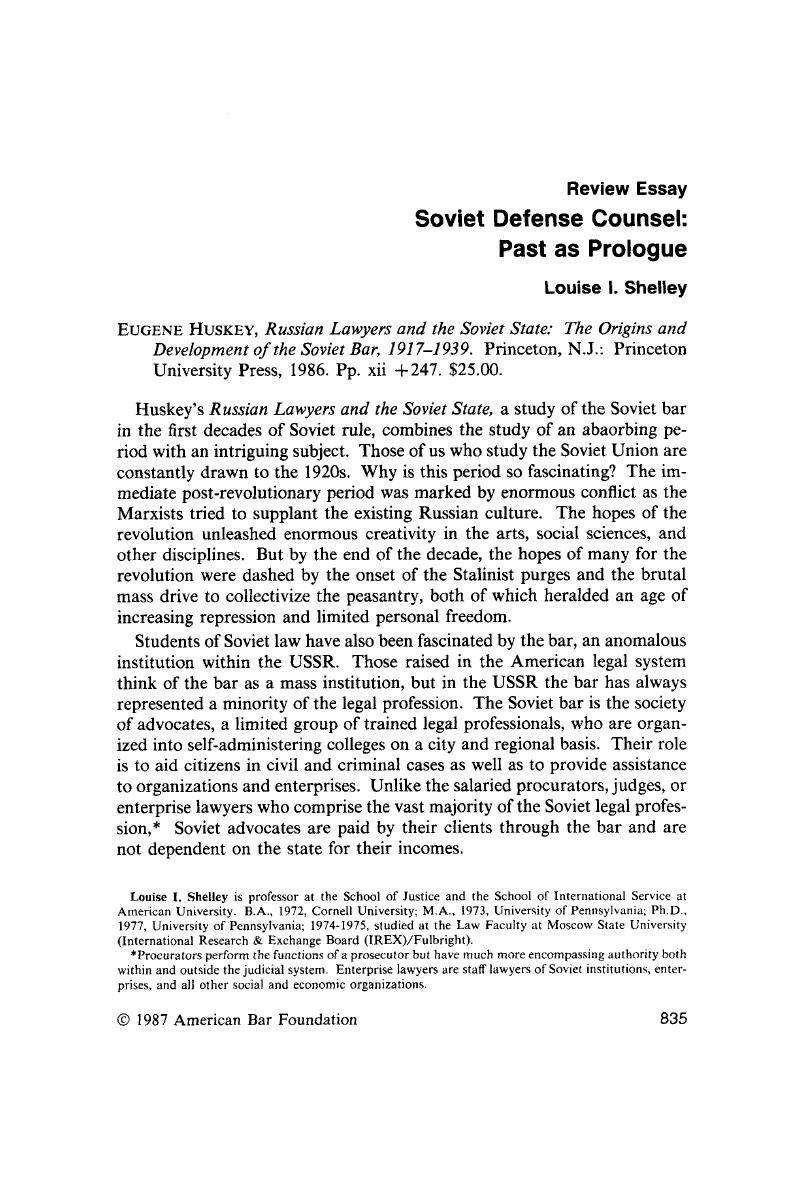No CrossRef data available.
Article contents
Soviet Defense Counsel: Past as Prologue
Published online by Cambridge University Press: 20 November 2018
Abstract

- Type
- Review Essay
- Information
- American Bar Foundation Research Journal , Volume 12 , Issue 4: Special Review Issue , Fall 1987 , pp. 835 - 848
- Copyright
- Copyright © American Bar Foundation, 1987
References
* Procurators perform the functions of a prosecutor but have much more encompassing authority both within and outside the judicial system. Enterprise lawyers are staff lawyers of Soviet institutions, enterprises, and all other social and economic organizations.Google Scholar
1 Adam B. Ulam. The Bolsheviks 108 (New York: Collier Books, 1965).Google Scholar
2 Id., at 212.Google Scholar
3 Id., at 3–20.Google Scholar
4 Ger P. van den Berg, The Soviet System of Justice: Figures and Policy 162 (Dordrecht: Martinus Nijhoff, 1985).CrossRefGoogle Scholar
5 Harold J. Berman, Soviet Criminal Law and Procedure: The RSFSR Codes 2nd. ed. 17–18 (Cambridge: Harvard University Press, 1972).Google Scholar
6 Peter Juviler, Revolutionary Law and Order 50–53 (New York: Free Press, 1976).Google Scholar
7 Dina Kaminskaya, Final Judgement: My Life as a Soviet Defense Attorney 28 (New York: Simon and Schuster, 1982).Google Scholar
8 Id., at 28.Google Scholar
9 See, for example, Robert C. Tucker, Stalin a Revolutionary 1879–1929 A Study in History and Personality (New York: Norton, 1973) and Robert Conquest, The Great Terror (New York: Macmillan, 1968).Google Scholar
10 For a discussion in changes of the criminal law see Berman, supra note 5, at 30–31. Particularly essential to this ever widening net of the criminal law was the introduction of the doctrine of analogy into the 1926 Criminal Code. This provision permitted the arrest and prosecution of an individual for a socially dangerous act even if it is “not provided for by the present Code, the basis and limits of responsibility for it shall be determined by application of those articles of the Code which provide for crimes most similar to it in nature.” Berman, supra note 5, at 22.Google Scholar
11 John Dewey et al., Not Guilty Report of the Commission of Inquiry into the Charges Made against Leon Trotsky in the Moscow Trials 21 (New York: Harper & Brothers, 1938).Google Scholar
12 In 1934 the Special Board of the People's Commissariat of Internal Affairs (NKVD) was introduced, which allowed millions to be sent to labor camps in secret administrative procedures. See Berman, supra note 5, at 31.Google Scholar
13 For a discussion of the post-Stalinist changes see Harold J. Berman, Justice in the USSR: An Interpretation of Soviet Law, rev. ed. 66–96 (Cambridge, Mass.: Harvard University Press, 1963).Google Scholar
14 A. Iakovlev and I. Gamaiunov, V pol'zu spravedlivosti, Literaturnaia Gazeta, September 24, 1986, at 13, col. 3.Google Scholar
15 Zigurds L. Zile, Soviet Advokatura Twenty Five Years After Stalin, Soviet Law After Stalin Part III Edited by Donald B. Barry, F.J.M. Feldbrugge, George Ginsburgs and Peter B. Maggs, 207–237 (Alphen aan den Rijn: Sijthoff & Noordhoff, 1979).Google Scholar
16 Huskey, Eugene, Limits to Institutional Autonomy in the Soviet Union: The Case of the Advokatura , XXXIV Soviet Studies 200, 203 (1982).Google Scholar
17 Kaminskaya, supra note 7, at 24.Google Scholar
18 Id., at 31.Google Scholar
19 Louise I. Shelley, Lawyers in Soviet Work Life (New Brunswick, N.J.: Rutgers University Press, 1984).Google Scholar
20 Huskey, supra note 16, at 201.Google Scholar
21 Id., at 201, William Butler, Soviet Law 83 (London: Butterworths, 1983).Google Scholar
22 Van den Berg, supra note 4, at 163.Google Scholar
23 Huskey, supra note 16, at 201. For a general discussion of the role of counsel see A.A. Kruglov, Sovetskaia Advokatura i deiatel'nost' (Moscow: Iuridicheskaia Literatura, 1968) and D.P. Batman and V.A. Elizarov, Advokat v grazhdanskom protsesse (Moscow: Iuridicheskaia Literatura, 1969).Google Scholar
24 Butler, supra note 21, at 15.Google Scholar
25 For a discussion of this oration see V.D. Gol'diner, ed., Zashchititel'naia rech' (Moscow: Iuridicheskaia Literatura, 1970), which discusses the preparation of the final argument in criminal cases. K.N. Apraksin, Rechi sovetskikh advokatov po ugolovnym delam (Moscow: luridicheskaia Literatura, 1975) and S.A. Kheifets, Sudebnye rechi advokatov (Leningrad: Izd. Leningradskogo universiteta, 1972) contain speeches of individual lawyers. The first two books here came out in editions of 30,000 copies.Google Scholar
26 See van den Berg, supra note 4, at 260, as well as Peter H. Solomon Jr., The Case of the Vanishing Acquittal: Informal Norms and the Practice of Soviet Criminal Justice, Soviet Interview Project, Working Paper 28, January 1987.Google Scholar
27 Defense counsel, by revealing flaws in cases, help to ensure that one-quarter of cases are sent back for reinvestigation. Based on figures in A. Vaksberg, Pravde v glaza, 17 Literaturnaia Gazeta December 1986, at 13, col. 5; one in six of the cases sent back for reinvestigation is dropped entirely.Google Scholar
28 Most meetings with the client occur in prison. Because there is no bail in the USSR, almost all but the most minor offenders are held in prison until trial.Google Scholar
29 Kaminskaya, supra note 7, at 29. She notes that the fees in civil cases are equally small and for the consultations given in the bureau the fee is one ruble and for preparing legal documents is no more than three rubles.Google Scholar
30 Huskey, supra note 16, at 214.Google Scholar
31 Iakovlev and Gamaiunov, supra note 14, at 13, col. 4.Google Scholar
32 Huskey, supra note 16, at 201.Google Scholar
33 Yuri Luryi, The Right to Counsel in Ordinary Criminal Cases in the USSR, Soviet Law After Stalin, Part I, Citizen and the State in Contemporary Soviet Law, edited by Donald B. Barry, George Ginsburgs and Peter B. Maggs 105–115 (Leiden: Sijthoff, 1977).Google Scholar
34 Bukovsky, Vladimir, To Build a Castle, 234, 309–310 (London: Andre Deutsh, 1979) and Luryi, Yuri, The Role of Defense Counsel in Political Trials in the USSR, 7 Manitoba Law Journal, 307 (1977). For a discussion of a case against a religious figure handled by the KGB, see the report of his defense attorney Lev Iudovich, Delo Adel'geima, 16 SSSR: Vnutrennye protivorechiia 238 (1986).Google Scholar
35 Kaminskaya, supra note 7, at 31.Google Scholar
36 The most well-known case of an expulsion of a lawyer was that of the defender of the dissident Aleksandr Ginzburg, Boris Zolotukhin, who was expelled from the Moscow Bar following Party pressure. See Kaminskaya, supra note 7, at 313–319.Google Scholar
37 Iakovlev, and Gamaiunov, , supra note 14, at 13; Kudriavtsev, V.N., Zakon i Demokratiia, Izvestiia, October 4, 1987, at 3; Savitsky, V., Ways of Restructuring the Legal System: The Prestige of the Bar, XXXIX Current Digest of the Soviet Press 7 (1987).Google Scholar
38 Id.Google Scholar
39 Savitsky, supra note 37, at 7.Google Scholar
40 Huskey, Eugene, The Politics of the Soviet Criminal Process: Expanding the Right to Counsel in the Pre-Trial Proceedings, 34 American Journal of Comparative Law 93 (1986).Google Scholar
41 Officials Opposing Legal Changes, Soviet Official Says, Reuters wire, February 9, 1987.Google Scholar




